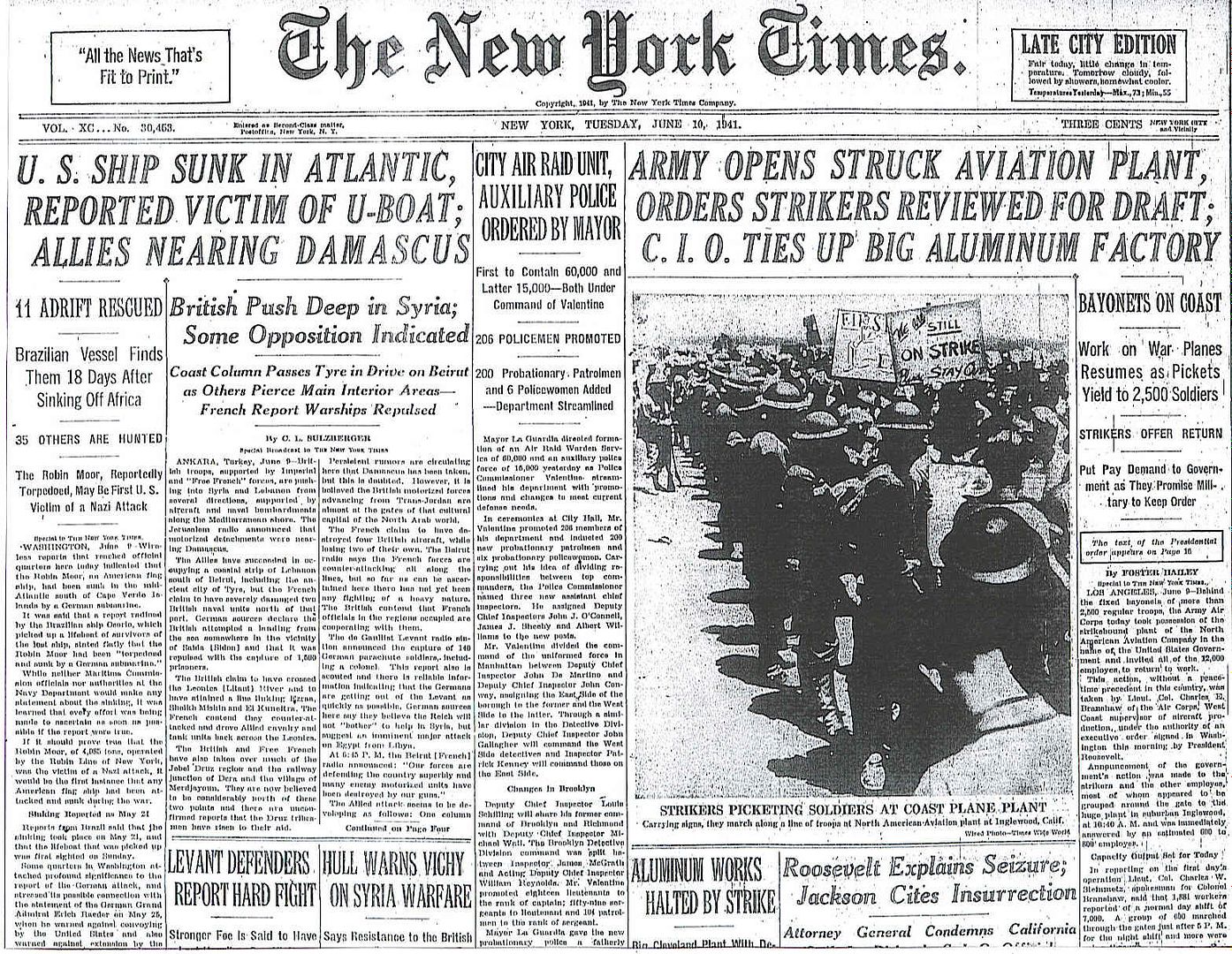
Posted on 06/10/2011 4:41:03 AM PDT by Homer_J_Simpson

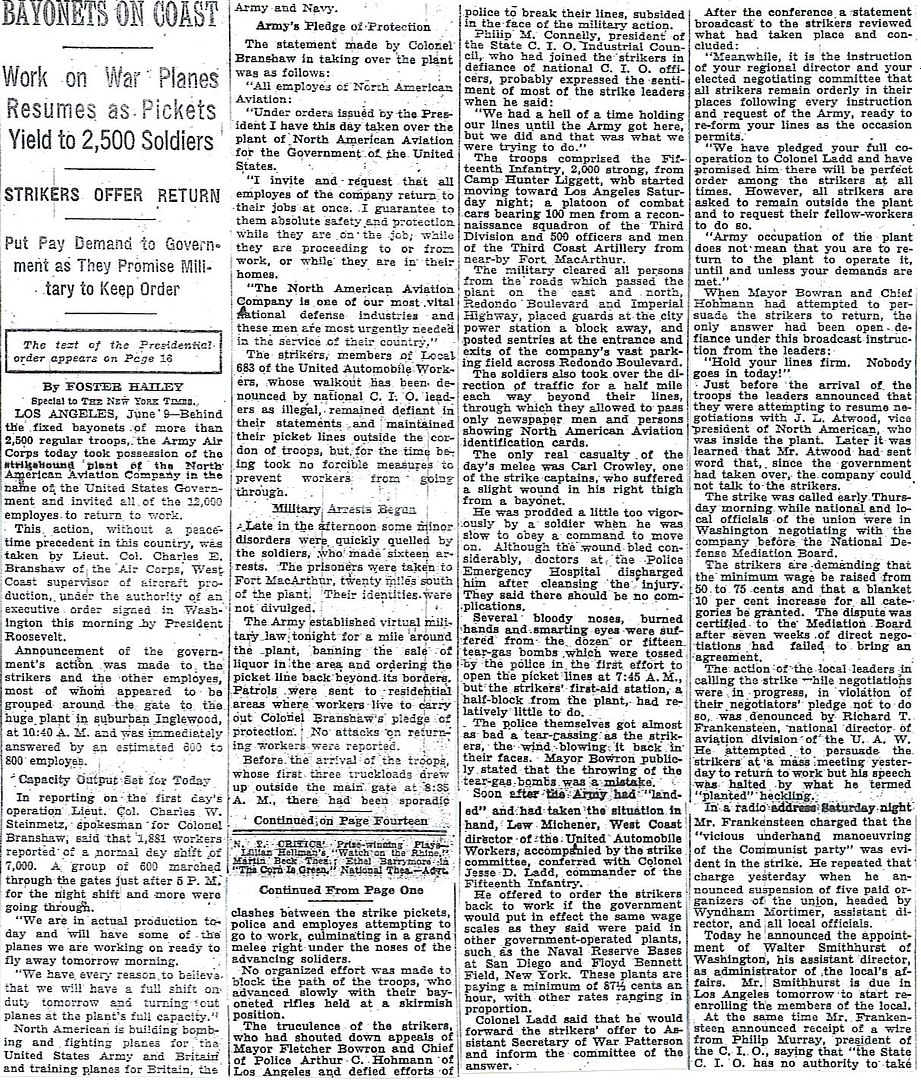
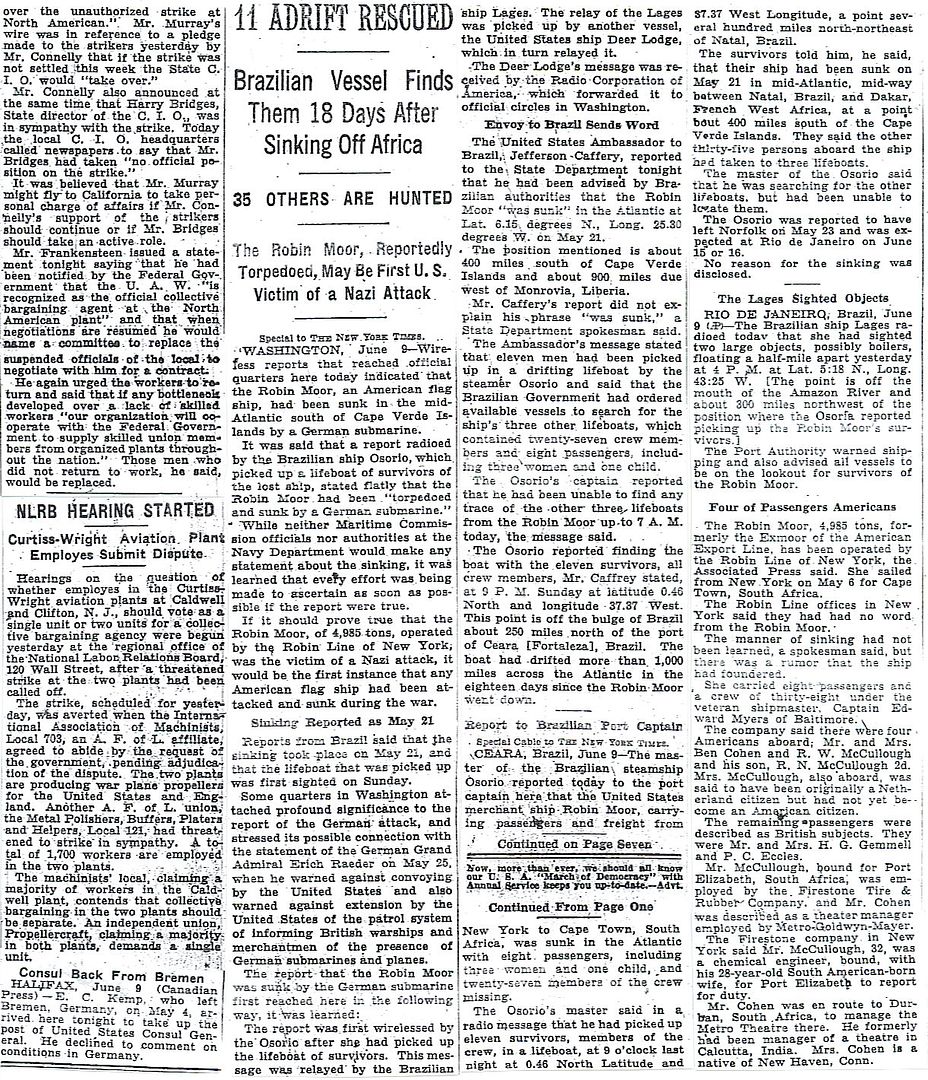
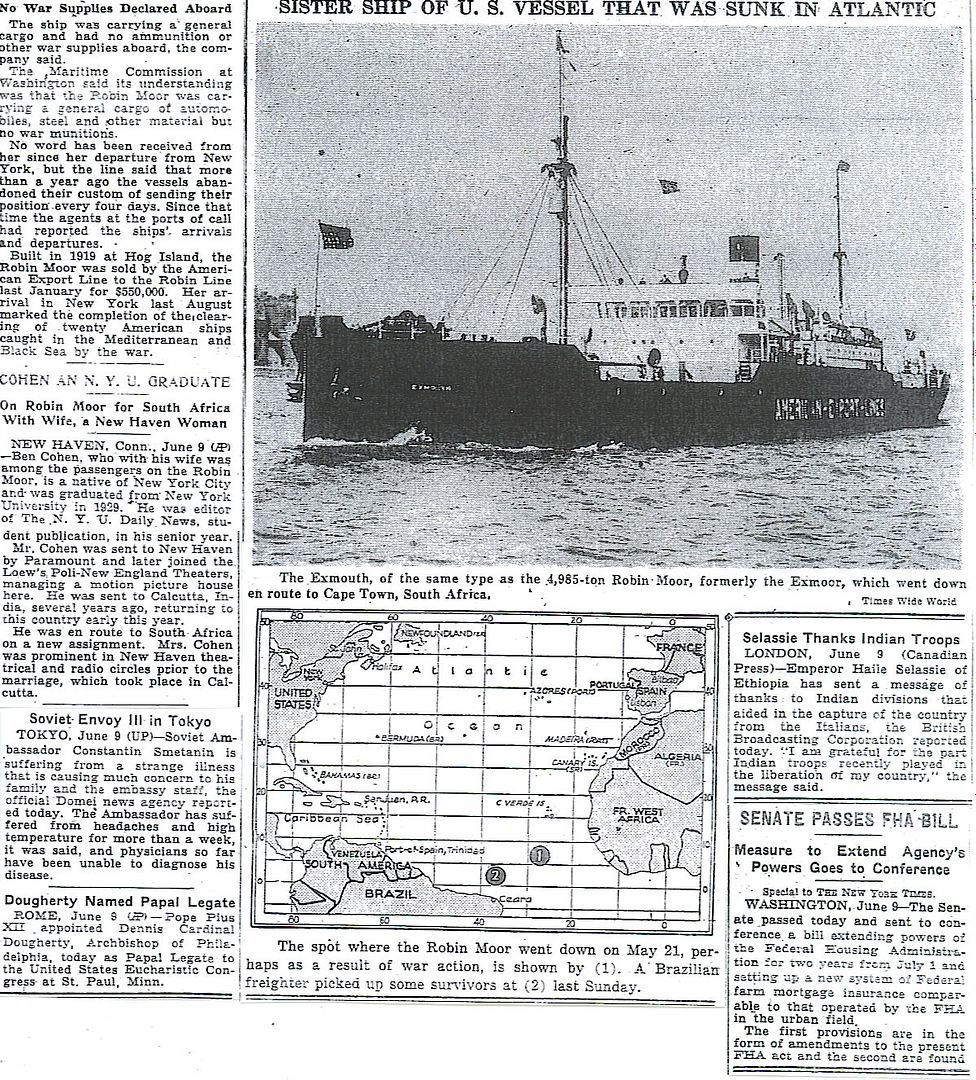
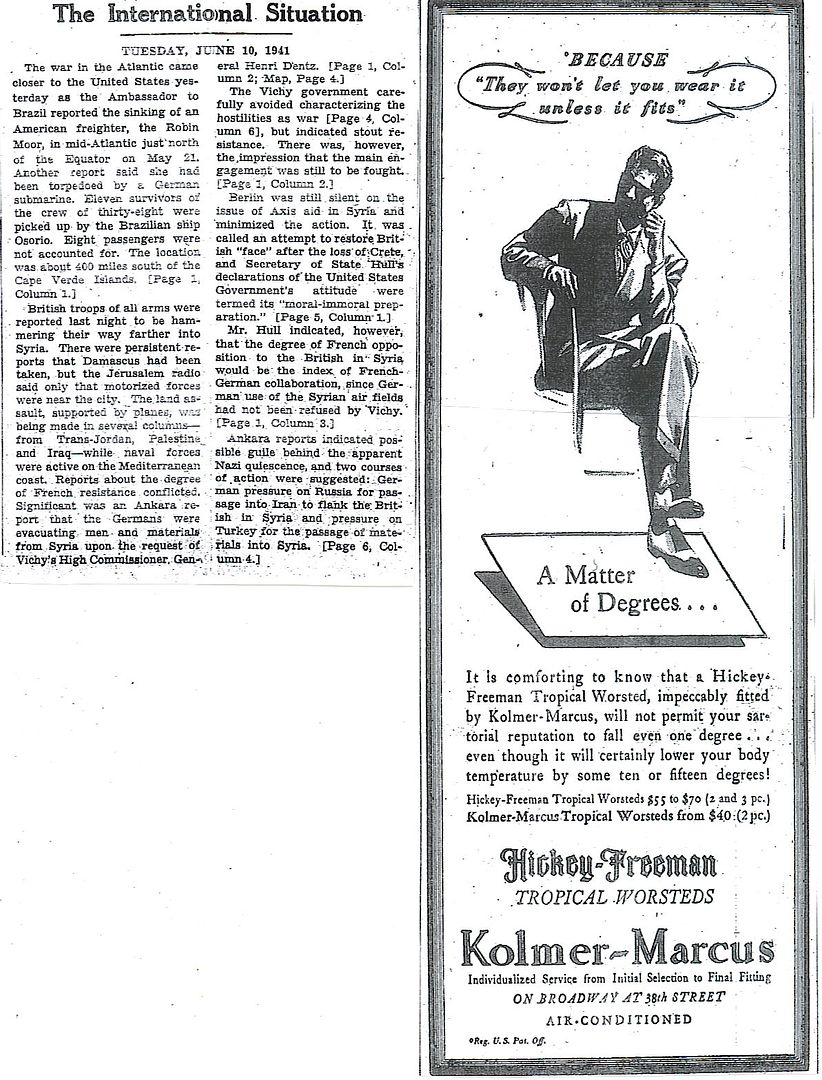
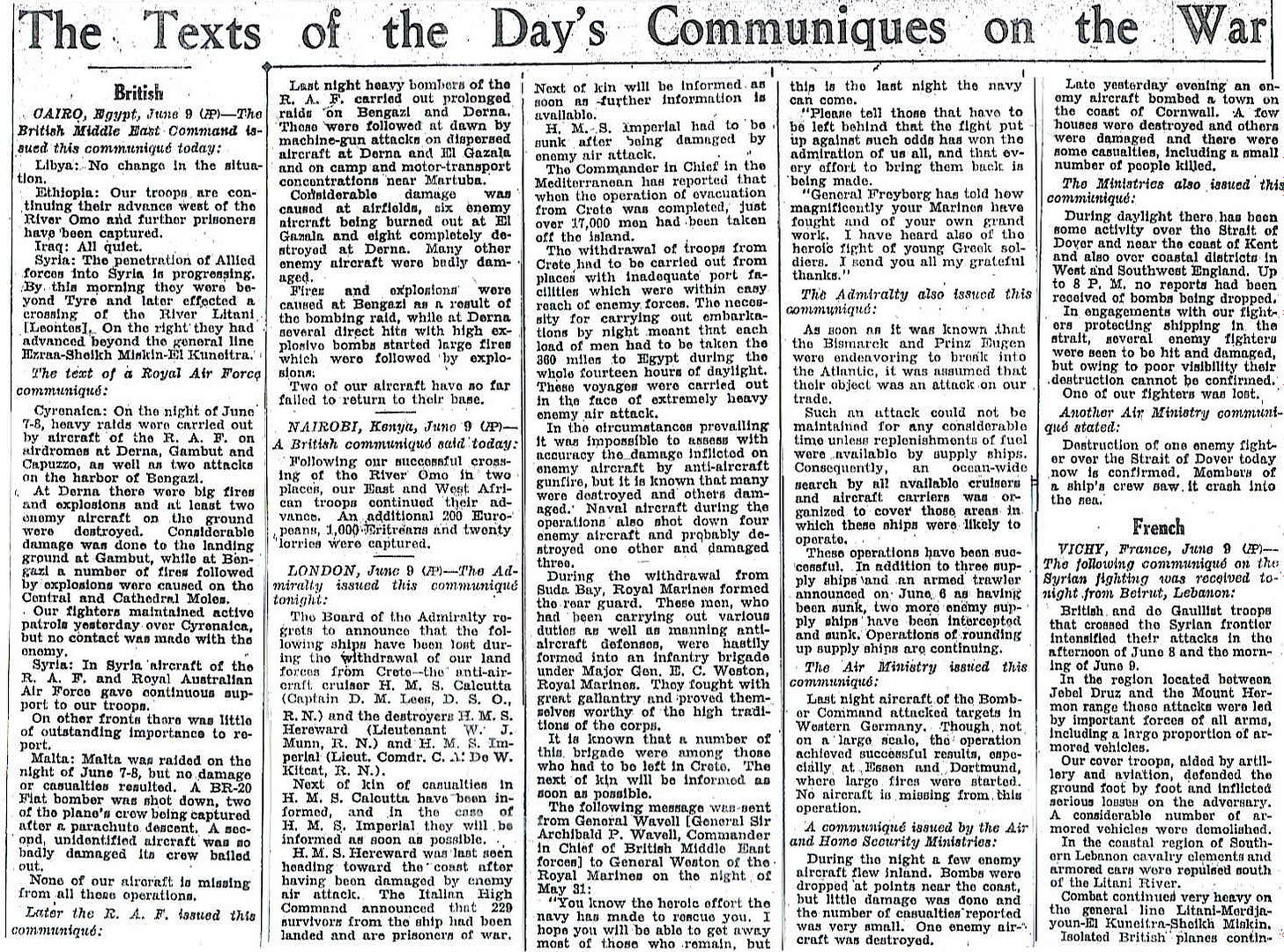
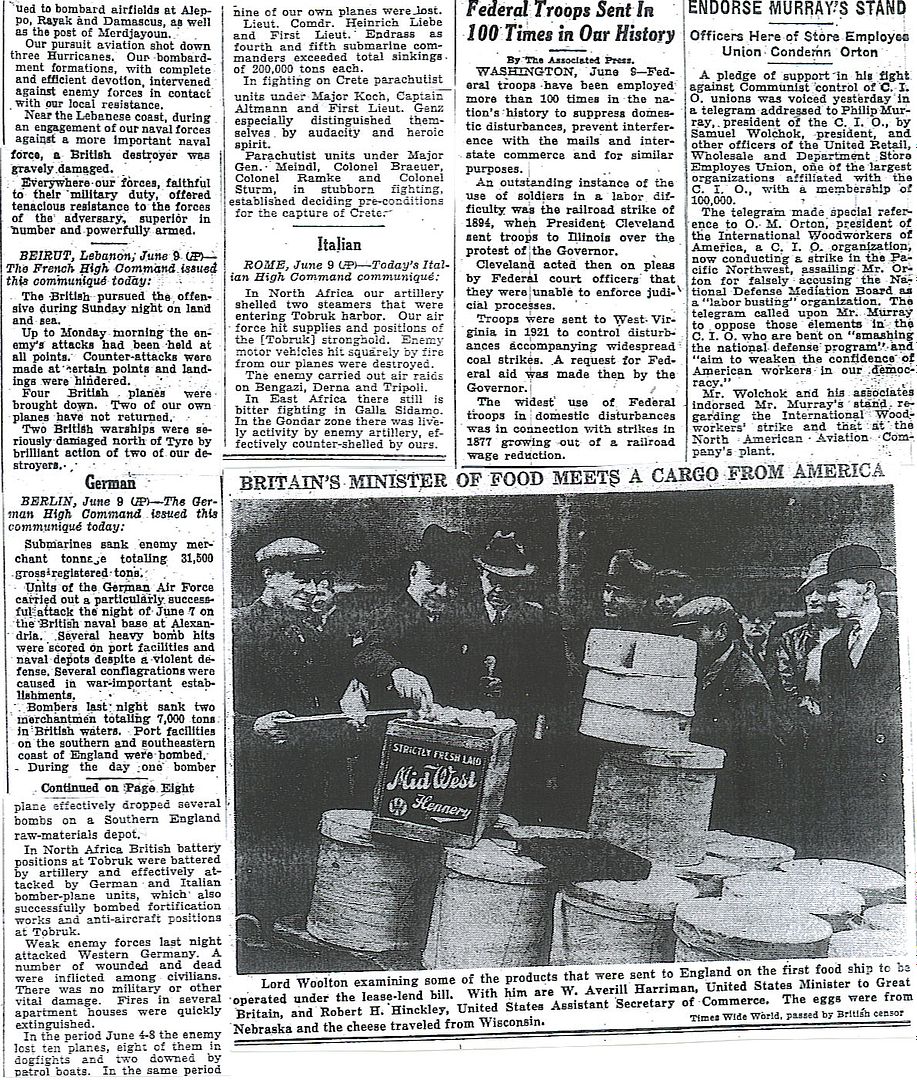
http://www.onwar.com/chrono/1941/jun41/f10jun41.htm
Australians reach the Litani
Tuesday, June 10, 1941 www.onwar.com
In Syria... Australian forces advancing along the coast north of Tyre begin improvising crossings over the Litani River.
In East Africa... An Indian battalion lands and captures Assab, the last Red Sea port held by the Italians. There is fighting southwest of Addis Ababa near Galla Sidamo.
http://homepage.ntlworld.com/andrew.etherington/month/thismonth/10.htm
June 10th, 1941
UNITED KINGDOM:
Westminster: Winston Churchill told MPs today: “I have not heard that Herr Hitler had to attend the Reichstag and say why he sent the BISMARK on her disastrous cruise. I have not heard that Signor Mussolini has made a statement about losing the greater part of his African Empire.”
He was annoyed that the Commons forced a debate about the loss of Crete, and said that it would be better for the government to decide the timing of discussions about the conduct of the war. He fiercely defended the government, but insisted that as Parliament’s “lifelong servant” he will do as it says.
London Gazette - medal citations for MT ATHELTEMPLAR.
Member of the Most Excellent Order of the British Empire Chief Engineer, Valentine Thomas Basil Godfrey And Lloyd’s War Medal for Bravery at Sea. The Lloyd’s citation:
The ship was attacked by enemy aircraft and set on fire. The chief officer was severely wounded, and all the other executive officers were killed. The chief engineer got the starboard boat away with 14 of the crew, some of whom were wounded, and transferred them to the rescuing ship. Returning to his own vessel with another party he found the fire was out, but that all the steam lines had gone, and there were about 2 ft. of water in the engine-room, covering the dynamos. The chief engineer at once arranged for towage and the vessel was brought into port.
King’s Commendations for Brave Conduct Boatswain John Richard Bell, and Gunner Thomas Newton. (Bernard de Neumann)
Corvettes HMS Mayflower, Spikenard, Trillium and Windflower departed Aultbea to escort Convoy OB-332 for St John’s, Newfoundland. (Dave Shirlaw)
NORTH SEA: Patrol sloop HMS Pintail is mined off the Humber while escorting Thames/ Forth coastal convoy FN447 and sinks in the Humber estuary at 53 30N, 00 32E.
FRANCE: The German authorities expel most of the foreign diplomatic staff from Paris.
Admiral Darlan urged French to conquer their illusions and consent to sacrifices. (Dave Shirlaw)
POLAND: Aerial units of the German Luftwaffe begin to form up in preparation for Operation Barbarossa.
ERITREA:
A British Indian Battalion lands and captures Assab, the last Red Sea port held by the Italians.
Massawa:
Here in the dockyard sappers are already preparing for the arrival of US-registered ships in the Red Sea. This is the prize for the Allied victory in Eritrea. Last year,when Italy declared war, the US Congress declared the Red Sea a combat zone. Neutral US ships must stay out. For 11 months supplies were unloaded at the Cape, reloaded onto British ships and brought to Egypt. Now with all the East African coast in Allied hands, and Italy’s naval squadron at the bottom of the Red Sea, Congress will reverse its position, and US ships may sail to Suez.
SYRIA: On coastal axis 21 Aust Brigade continue the advance past the Litani but are stopped in the afternoon by French positions on the coast road.
Australian forces cross the Litani River in Syria.
During a reconnaissance flight over Deraa, a well-known French pilot, Capitaine Jacobi of 6 Squadron, 3rd Fighter Group, was shot down by the British air defence.
This afternoon the air crews of French 7 Squadron, 1st Fighter Group received orders to “drive off small units of the British Navy” that were firing uninterruptedly at the French-held coast; but it turned out that these “small units” were the whole of the British 15th Cruiser Squadron, and the French swiftly halted their operations.
RAF forms a new 127 Squadron at Habbaniya, Iraq, equipped with four Hurricanes and four Gladiators. (Michael Alexander)
CANADA: Twenty Four River Class frigates are ordered: HMCS Dunver, Cape Breton, Outremont, Valleyfield, Thetford Mines, Joliette, Cap-de-la-Madeleine, Stormont, Matane, Montreal, Grou, Saint John, Stettler, Edmunston, Magog, Longueuil, La Hulloise, Eastview, Beacon Hill, Kokanee, St Catharines, Waskesiu, Prince Rupert, Swansea. (Dave Shirlaw)
U.S.A.: Secretary of State Hull reassured Portugal as to its islands in the Atlantic. (Dave Shirlaw)
http://worldwar2daybyday.blogspot.com/2011/06/day-649-june-10-1941.html
Day 649 June 10, 1941
Operation Exporter. Allied troops make slow progress North out of Palestine. They capture a number of villages and small towns in Southwestern Syria. In Lebanon, the initially rapid advance of Australian 7th Division towards Beirut is slowed by blowing of bridges over the Litani River by the French defenders.
U-boats sink 3 freighters in the North Atlantic from the coast of Ireland to within 500 miles of the Canadian coast.
In the Humber estuary, steamship Royal Scot hits an acoustic mine and sinks. Patrol vessel HMS Pintail assists but also sets off an acoustic mine, sinking immediately 55 killed, 22 rescued by destroyer HMS Quantock and another ship).
Federal Troops Sent In 100 Times in Our History
Washington, June 9 - Federal troops have been employed more than 100 time in the nation’s history to suppress domestic disturbances, prevent interference with the mails and interstate commerce and for similar purposes
An outstanding instance of the use of soldiers in a labor difficulty was the railroad strike of 1894, when President Cleveland sent troops to Illinois over the protest of the Governor.
Cleveland acted then on pleas by Federal court officers that they were unable to enforce judicial processes
Troops were sent to West Virginia in 1921 to control disturbances accompanying widespread coal strikes. A request for Federal aid was made then by the Governor.
The widest use of Federal troops in domestic disturbances was in connection with strikes in 1877 growing out of a railroad wage reduction.
The only real casualty of the day’s melee was a Carl Crowley, one of the strike captains, who suffered a slight wound in his right thigh from a bayonet.
He was prodded a little too vigorously by a soldier when he was slow to obey a command to move on. Although the wound bled considerably, doctors a the Police Emergency Hospital discharged him after cleansing the injury . They said there should be no complications.
You don’t think a contingent of police officers show up at a strike action without medical support?
They’d roll up with wagons and tents, just in case. Sorta like an Army logistics operation.
Boy, that's a tough one. The Roosevelt administration would say this is a national security matter, and they would have a point. But who gets to decide what constitutes such? I can think of an administration that would have a much different idea of what national security means than most of us here.
Yeah, I was thinking M*A*S*H.
Note to self: When man carrying rifle with fixed bayonet tell me to "move along," move along.
I like how the clothing store advertisement includes that it’s “air-conditioned”.
From: http://en.wikipedia.org/wiki/SS_Robin_Moor
“Eventual rescue
When the Robin Moor was stopped, the Germans had forbidden the ship’s crew to touch their wireless, but after the sinking U-69’s captain Jost Metzler reportedly promised the ship’s crew to radio their position. Yet nearly two weeks passed before any of her four lifeboats of survivors were discovered. As President Roosevelt would later state in a message to Congress regarding the sinking, the survivors were “accidentally discovered and rescued by friendly vessels.” The lifeboat containing the captain and 10 others was rescued on 8 June after 18 days, and taken to Brazil. The occupants of that boat presumed that the remaining crew and passengers were lost, but they later learned that the three lifeboats containing the others had been discovered by chance on June 2, 13 days after the sinking, and taken to South Africa. Remarkably, all of the crew and passengers were rescued. One rescued crew member, however, later jumped overboard apparently due to the lingering effects of the ordeal, and drowned.”
I regard this as justified by a genuine emergency at a time when the Atlantic War was going badly and British Commonwealth was carrying the war almost by itself. IIRC the CIO was infested with Communists who were under KGB orders to derail production of war materials needed to aid Britain and prepare the US for imminent entry into war with Germany. The USSR was hoping to preserve its Polish and Baltic ill-gotten gains from the Hitler-Stalin pact.
When the German attack on the Soviets begins later this month, all of a sudden the Commies in the US unions encourage full production of war materials and labor peace to help save the USSR.
It's a win-win for the business. It attracts customers to the store when the global warming grows intense and then they don't sweat all over the merchandise when they try it on.
In Germany and Western Europe the Rote Kapelle - Red Orchestra (the code name given by the Abwehr) - the German counter espionage organisation to the largest Soviet spy ring and resistance organisation, had been providing information to the USSR from 1938. However, in the spirit of the Russo-German Pact, Stalin had stood it down in 1939. It was reactivated following the German invasion of the USSR in 1941 and by 1942 had some 100 radio transmitters forwarding information to the USSR.
The driving force behind the Rote Kapelle was Leopold Trepper, a Polish Jew who based himself in Belgium and made contact with dissident Germans. The most important of these were Harro Schulze-Boysen, grandson of Admiral von Tirpitz, and Arvid Harnack, nephew of a celebrated theologian, whose wife Mildred was American.
In the Far East a brilliant but eccentric Communist agent Richard Sorge had from February 1941 been warning the Russians that the attack was in the offing.
Among the other indicators of an impending attack on the ground was the Otto-Programme or Otto Programme, "Otto" standing for Ost or East. It was the code name for the development between October 1,1940 and May 10, 1941 of road and rail links through Eastern Europe to the borders of the USSR in preparation for Unternehmen Barbarossa.
In 1941 the German troop strengths began to change on the Soviet German border. In early March 1941 there were 34 divisions, by April 23 this figure had risen to 59 and finally by June 5 there were 100 divisions in the East.
On June 21 a young German Communist named Korpik slipped away from his unit's concentration area in Poland and crossed the border into the USSR in order to warn them of the impending attack. Writing of the incident after the war, Nikita Kruschev, the then leader of the USSR, reported that on Stalin's orders Korpik was shot as an agent provocateur.
On June 13 the Soviet authorities in the Baltic States of Estonia, Latvia and Lithuania, sovereign countries that had been occupied by the USSR in October 1939, arrested 50,000 potential enemies who might assist the Germans. Two days later German higher formation commanders were told the date and time of the impending attack on the USSR and armoured formations began to move up under cover of the short summer night.
On June 17, Finland began a secret mobilization. The Finns had been cultivated as potential allies by the Germans since 1940 and had agreed to seal off the northern Soviet port of Murmansk and to attack in the south east in the Lake Ladoga area near Leningrad. They were keen to reclaim the land lost to the USSR at the end of the Winter War.
On June 19 deserters from the German forces had filtered across the border and warned the Soviet forces of the impending attack. Like Korpik they were ignored, however black-outs were ordered for the major cities and towns near the border.
The Axis forces appeared formidable -weapons and equipment had been tested in battle and the men were veterans of three years of combat. They were, however, attacking an enemy of who they knew very little and across terrain that was unfamiliar.
For young men who had grown up in the close country of Western Europe or the city streets of the Ruhr, Hamburg or Berlin, the open plains of the steppe and distant unattainable horizons would become oppressive.
The USSR was 46 times bigger than Germany in its 1938 borders - it also had a population of 190,000,000 of whom 16,000,000 were men of military age. If it could buy time, the weight of these numbers would begin to take effect. Though the tanks would be the cutting edge of the attacks, supported by Panzergrenadiers in SdKfz 251 half tracks, the bulk of German forces would advance at the same speed as Napoleon's Grande Armee when it entered Russia in 1812. Men marched and were backed up by horse-drawn wagons, guns and field kitchens - the German Army deployed 750,000 horses for the attack on the Soviet Union. Of the 153 divisions in Barbarossa, 119 still contained horse-drawn vehicles.
Blitzkrieg Russia 1941-1942 -Will Fowler
Many observers have written about the slow, inexorable depression that the leaders in Berlin plunged into as the Russo-Soviet war progressed, but there were many men in more humble circumstances who were also deeply concerned at the loss of so many future fathers, future leaders of their country. One of these was a padre serving in a German mountain unit who had fought alongside his men throughout the long years of the war. Let his words of worry and concern be the epitaph to this war on the Eastern Front. He wrote these words in the autumn of 1941, shortly after the battle of Uman and only 4 months after the start of the war:
“Today I buried some more of my former parishioners who have died in this frightful land. Three more letters to write to add to the total of those which I have written already in this war. The deleted names of the fallen are now more numerous in my pocket diary than the names of the living. My parish is bleeding to death on the plains of this country. We shall all die out here.”
I was trying to recall a recent similar incident when I remembered that GHWB sent Federal Troops to New Orleans after the hurricane. It’s weird in that I had always had in the back of my mind that using regular Army (as opposed to National Guard) inside the U.S. was illegal. I guess not.
LOL
Disclaimer: Opinions posted on Free Republic are those of the individual posters and do not necessarily represent the opinion of Free Republic or its management. All materials posted herein are protected by copyright law and the exemption for fair use of copyrighted works.